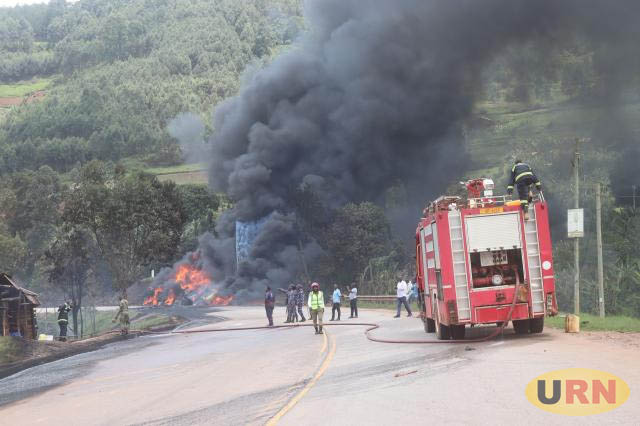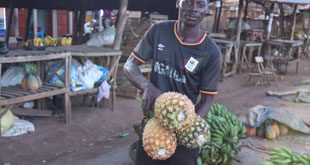
Kigoogwa, Uganda | THE INDEPENDENT | The recent incident involving a fuel tanker fire in Kigoogwa town, along the Kampala-Gulu highway, has highlighted serious shortcomings in local health and evacuation services. The accident occurred on Tuesday last week when a tanker, registered as UAM 292Q, overturned and caught fire.
Several residents rushed to siphon fuel from the leaking tanker before it exploded, leading to a devastating fire that engulfed nearby shops. At least 11 people died on the spot, while others suffocated in their homes. Since then, the death toll has risen to 24, with additional victims succumbing to injuries in health facilities.
Residents of Kigoogwa, a growing town located 22 kilometers from Kampala, reported facing inadequate health and evacuation services, which hampered response efforts and cost lives. During the initial evacuation, injured individuals were taken to local health centers within Kigoogwa, Buwambo, and Matugga, but these facilities were unable to handle the scale of the emergency.
Among the facilities was Buwambo Health Center IV, a government health center about three kilometers from the scene. At least three patients were transferred there, including Hassan Katamba, Ashraf Hussein, and Fahim Male. Dr. Bruno Sserunkuma from the health center explained that they provided immediate care, including resuscitation, stabilization, and antibiotics, but could not offer comprehensive treatment.
“We did debridement to remove the skin that had been burnt and applied antibiotics to control the infections. We also administered painkillers and referred the patients for further management because, at our level, we couldn’t handle them,” said Dr. Sserunkuma.
However, it was reported that due to the lack of an ambulance, the facility had to rely on police patrol cars to transport the patients. From there, they were taken back to the scene, where ambulances provided by the Red Cross finally evacuated them to Bombo Military Hospital. Despite these efforts, Katamba later died from the severe injuries he sustained in the fire.
Mark Kizito, a resident of Kigoogwa, shared that some patients were forced to use motorcycles to reach Bombo Military Hospital after two local medical centers declined to treat them due to a lack of essential supplies and trained personnel. Joseph Musoke, the Chairperson of Buwambo Health Center, has since called on the government to upgrade and equip the facility to better handle such emergencies.
“Transporting a patient from Kigoogwa to Kiruddu Hospital or other hospitals takes a lot of time, especially with heavy traffic jams that slow down movement. So if Buwambo HC IV was well equipped, probably more lives would have been saved,” said Musoke.
Buwambo HC IV serves as a government referral facility for Nansana Municipality. On Thursday, tensions flared when boda boda riders gathered at Wanda Hospital in Matugga, where a colleague was seeking treatment. They pressured the administrators to refer their colleague to Kiruddu Hospital, citing their inability to afford the medical expenses at the private facility.
A total of 26 victims from the fire were admitted to Kiruddu National Referral Hospital, including a pregnant woman who was later transferred to Mulago Women and Neonatal Hospital.
Two individuals died, while others remain in critical condition. Caretakers and friends have expressed concerns about the costs associated with their treatment, estimating that at least 300,000 Ugandan shillings per day is needed to purchase additional essential drugs from private pharmacies, as well as to cover food and other needs.
Since then, boda boda riders in Kigoogwa town have launched fundraising campaigns to support their colleagues who are currently receiving intensive care. Ivan Kintu, a boda boda rider from Kaddu Stage, explained that they have no choice but to raise funds, as the daily requirement of 300,000 shillings for medicines is beyond their means.
“We need to help our friends by raising money because each day a patient has to buy drugs outside the facility, and this amount is not affordable for us,” said Kintu. Other riders have expressed concern that more patients may not survive due to the financial strain.
The government has donated one million Ugandan shillings to assist the injured patients, but caretakers argue that this is insufficient to cover the ongoing costs of medication and basic care.
As the community continues to grapple with the aftermath of the tragedy, there is a renewed call for improvements in emergency preparedness and healthcare infrastructure to ensure that similar incidents in the future are handled more efficiently and effectively.
****
URN
 The Independent Uganda: You get the Truth we Pay the Price
The Independent Uganda: You get the Truth we Pay the Price


